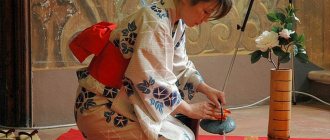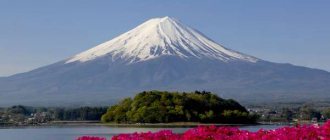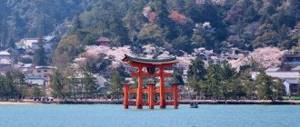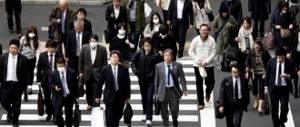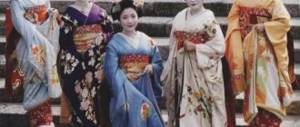- Save space at any cost
- Regular earthquakes
- Minimum walls, minimum doors
- Long live minimalism!
- Technological life
It's about how people live in Japan.
Communal apartments, cramped Khrushchev buildings - this is all familiar to us. For comparison, let's see how the Japanese live in tiny apartments? Yes, everything is not as many people imagine: spacious, bright housing with a minimalist design is a rare success. How is it really going? To begin with, let us remember that the territory of Japan is 70% filled with mountains. Therefore, in Japan there is little free land; houses are built high and placed as closely as possible to each other, neglecting courtyards. Hence the high cost of housing: studio 15 sq.m. in Tokyo it costs about 8 million rubles; a 40-meter apartment in a prosperous area of the capital will cost 40 million rubles.
Due to unaffordability, only 60% of the population owns their own housing. The dream of every Japanese is to have their own spacious living space. The Japanese would rather live outside the city and have a longer commute to work, but live in a more spacious house or apartment.
The population of Tokyo is about 38 million. The authorities, fighting huge traffic jams, are building various transport interchanges. The viaduct could literally pass next to someone's window.
Recommendations
First of all, if a person dreams of a long stay in this eastern country, he needs to start learning Japanese in advance - without this it will be very difficult. It is also recommended that you familiarize yourself with the culture and customs of that country to minimize disorientation. Even those individuals who, to some extent, already know about the traditions of the country and how ordinary people live in Japan can experience shock or psychological discomfort. But this effect can be reduced.
Based on your preferences, you should choose a city or at least an area where you can be at the very beginning. Depending on the purpose of your stay, the stopping place is determined. You may prefer a big metropolis like Tokyo or a small town to get to know the culture better and understand how the Japanese live in Japan. Mid-sized cities such as Osaka, Kyoto, Nagoya or Kobe also have their advantages. If a person has spent their entire previous life in a small town, moving straight to Tokyo can be a real shock.
Entertainment and art
Tokyo theater repertoire and information about shows in the capital are published in the free bi-monthly Metropolis magazine, which you can find in the hotel and in the foreign book departments of Kinokuniya and Maruzen stores. You can also look for posters of various types of performances on the Time Out Tokyo website (www.timeout.jp/en/).
As one of the most vibrant and significant expressions of Japan's cultural heritage, visiting the theater is an adventure in itself. Traditional Japanese drama, with its high degree of stylization, extravagant gestures, solemn and even eccentric intonations, is not easy to perceive and understand. However, once you accept the rules of the game, you will be rewarded for your patience. The passionate performance, combined with stunning costumes, skillful makeup and masks, has the ability to bewitch, and many skeptics eventually become its ardent fans. Japanese theater for the most part is focused not on the development of a coherent plot in the Western manner, but on creating a certain atmosphere through special intonations and violent expression of emotions.
Theater no
The oldest theatrical form is the most strict and complex. Originally derived from the ritual dances of the imperial court of Nara and Kyoto in the 14th century. but developed into a fully formed mask drama with singing, dancing and highly stylized action. The hero and only two or three supporting actors act out plays about gods, historical battles, ghosts, unhappy love and madness due to terrible grief. Dark themes are interspersed with kyogen farces about the lives of ordinary people, often with elements of satire.
Noh Theater Masks
The commentary is chanted by a chorus of six or eight narrators (reminiscent of the chorus in a Greek tragedy) who sit to the side of the stage. Musicians at the back of the stage provide powerful accompaniment to the action, playing flutes and drums. In contrast to the magnificent costumes, the stage design is laconically simple: the background (usually a constant wall as a backdrop) is in the form of a large pine tree and a small bamboo shoot. There is no curtain. The stage is crowned with a classic Japanese tiled roof, creating a “home” inside the theater.
All roles are performed by male actors wearing masks. Characters often enter and leave the stage for several minutes, moving painfully slowly and thus embodying the idea of the primacy of form over content. In the perception of theater fans, the performance is an eclectic nirvana, while for many other spectators it is a powerful soporific. Sitting in the hall, look around you and see that many Japanese involuntarily nod off.
Performance
The performance lasts several hours, as the number of plays can reach five. You'll probably be able to sit through at least two, and there's also a good buffet available during the intervals between plays. The best shows await you at the National Noh Theater in Tokyo, the Kanjo Kaikan Theater in Shibuya and the National Noh Theater in Kyoto. Good troupes also perform in Osaka and Kanazawa.
Kabuki theater
After the Tokugawa shoguns limited the audience of the theater to the samurai classes, classical drama acquired the character of elite entertainment. Kabuki theater became much more widespread. Also stylized, it is full of fantastic color, action and movement and includes both drama and comedy in its orbit. Actors have the status of folk heroes, and the greatest of them - representatives of centuries-old acting dynasties - are declared "living national treasures." The public shows itself in the most active way, shouting at their idols: “We have been waiting for you!” or “You are the best in Japan!”
They don’t skimp on costumes and sets; there is no concept of excess. Since the 18th century. supernatural characters are brought into the action of the play through the use of a turning stage and trapdoors. A popular art form of the highest order, kabuki tells stories of horror, murder and passionate love. Connoisseurs expect standard moves from him: a colorful parade of courtesans, a blood-chilling seppuku suicide, exciting fight scenes and, as the highest manifestation of the art of kabuki, the conclusion of a romance that the heroine must abandon, perhaps to save the honor of her lover, but never because that I fell out of love.
In reality, “she” could be a 60-year-old man. At the dawn of kabuki at the beginning of the 17th century. The famous Kyoto dancers began to give increasingly erotic and frivolous performances. And since the most ardent fans of the performing stars often started fights, the decent Tokugawa shogunate, in order to avoid shocks and unrest, considered it best to get rid of the performers altogether. However, it turned out that young people who took on female roles also enjoyed considerable success, in particular among the military and even clergy (homosexuality was not perceived then as something shameful). As a result, young people were replaced by older ones. After many years of study, these actors, called onnagata, convey with great skill and tact the gestures and movements of both young girls and decrepit old women with equal skill and tact.
Tokyo's famous Kabukiza theater was demolished in 2010 to be reborn as a building with improved earthquake resistance and better accessibility for people with disabilities. In the new theater, scheduled to open in 2013, spectators will also be able to listen to simultaneous translations of performances into English through headphones.
The Kyoto kabuki troupe performs in December, and the Osaka troupe performs in May.
Bunraku
Performances of Japan's famed puppet theater can be seen at the National Bunraku Theater in Osaka's Nipponbashi district, although performances also take place at Tokyo's National Theater for several weeks each year. It should be borne in mind that bunraku is a theater for adults rather than for children, and in it the same themes are raised, the same conventions apply, and the same dramatic plots are played out as in the noh and kabuki theaters, although the characters appear before the audience in the guise of colorfully costumed dolls almost human-sized.
Bunraku Puppet Theater
The black-clad puppeteers are initially clearly visible and distracting as they walk around the stage and manipulate the puppets, but as the action takes hold of your attention, the people disappear completely from view. A detailed summary of the plot in English is always available, sometimes in the form of a pre-recorded commentary that can be listened to from a special wireless device. The heyday of bunraku came at the beginning of the 18th century, when the playwright Monzaemon Chikamatsu wrote plays for the puppet theater that are considered one of the greatest works of Japanese literature. The main themes are heroism demonstrated in battle and the noble values of the samurai tradition. The scenes where the dolls, which the audience has already begun to perceive as living people, commit ritual suicide look quite shocking. The emotional impact is amazing, especially since the prop masters display miracles of savage naturalism.
Movie
Japan's cinemas have suffered a long decline as audiences prefer to watch DVDs at home, but the country's cinema has no shortage of talented directors and actors. Although Hollywood products lead in terms of box office receipts, European art cinema is also extremely popular. The same goes for violent gangster dramas and the growing number of “film adaptations” of best-selling manga books. Fortunately, serious Japanese cinema is still being made, and many Japanese directors have successfully won prizes at international film festivals.
Night life
Tokyo's cosmopolitan restaurant districts of Akasaka and Roppongi offer quality jazz bars, nightclubs and even country and western saloons.
Rock concert
Night diner
Robot show
Japan's diverse palette of live music includes its own brand of J-pop music. The world's brightest stars, from the Beatles to Britney Spears, have strived and strive to perform in a country with the second largest music market in the world. In addition to concert halls and rock venues like the Tokyo Dome, Japanese and foreign rock bands appear in clubs called "live house". The best of them are in Shinjuku, Shibuya and Shimokitazawa. If you don’t mind performing yourself, go to one of the many karaoke establishments, where you can always sing in a separate booth, but never in front of an audience.
Anime
The fantastic cartoon world of Japanese anime has legions of fans around the world.
Derived from manga (comic books read by young and old), cartoons are very different from the animated films that most Westerners grew up with. Some are addressed to children, but are so visually frantic that in comparison “Songs with Hello” seem calm and measured. Those aimed at an adult viewer are full of violence and sexuality, often with an apocalyptic view of the future. Some of the best works in this genre include Otomo Katsuhiro's classic Akira (1989), Mamoru Oshii's Ghost in the Shell and the works of Miyazaki Hayao, dubbed the Japanese Walt Disney. Still from the anime “Spirited Away”
Benefits of relocation
Constant study and expansion of their own point of view on the situation and the world awaits those who move to this unique state. It's not hard to guess that everything is different in Japan, especially the culture. What is obvious and normal for us is not so for this nation. Therefore, it is very important to be open to a completely new and completely different culture. Of course, first impressions and relationships with local people are not enough to fully learn to live the way ordinary people live in Japan. You need to understand that this will take some time. During this adaptation period, it would be good to plunge deeper into the basic concepts of the nation, to study its way of life and traditions. In general, Japan is a completely different country from the point of view of a certain cultural code, one might even say that it is a different planet!
And we can learn a lot by living abroad and going through different environments. This requires certain adaptation capabilities and expansion of one’s own framework. In order to join the general flow of how ordinary people live in Japan, you should, in a sense, forget about your culture and absorb this new, different one. Only in this way will we be able to understand and experience things that are unusual for us and a completely different view of the world.
Discipline and rules
Regarding how ordinary people live in Japan, one must take into account that this country is full of strict rules. And if a person wants to arrive there, they will need to be adhered to. And there are quite a lot of restrictions!
As for how Russians live in Japan, we can say that they have to change radically. Our compatriots are learning a completely different approach to neighbors, colleagues, etc. It is about always considering the other person, at every slightest opportunity. In reviews of how people live in Japan, there is information that all these rules and the specific division of classes are reminiscent of the socialist system, which works perfectly here.
Convenience
Convenience and feeling of comfort are the most important things in the world for local residents. Everything that is in this country is thought out literally to the smallest detail. Everything here is available virtually at any time - especially the food! Describing how people live in Japan, Russians note the hard work of this eastern people.
In this country, few people sleep, and people work 24/7. Yes, the stereotype about Japanese people who love to work couldn’t be more true. There are many grocery stores here that are open 24 hours a day. Cafes open until late and offering all kinds of dishes that can be purchased at night. All food is delicious and fresh! There are also cheap restaurants called open terraces where you can eat and drink unlimitedly for 2 hours for a fixed fee. It's very cheap in Japan. There are countless clubs and bars here, they are open all night. The service is perfect, almost like robots, because in this country the customer is always right. Visitors here have the highest standards and expectations, hence it is difficult to please them, which, according to Russians, is both a good and a bad thing.
Sound advertising
Picture taken from YouTube
Japan has strict requirements regarding silence in public places. But at the same time, there is a huge amount of moving and stationary sound advertising in the country. Cars with a loudspeaker mounted on the roof move along the streets. They advertise everything from an appliance repair company to fresh bread. The Japanese are tired of this to the point of gnashing their teeth, because the vans fill the streets with loud sounds even on Sundays. And this is the only day when people can get a good night's sleep.
Delight
Walking around the city, you can always discover interesting places, and usually these are beautiful Buddhist temples, squeezed between houses or shops, sometimes hidden in the streets, which also have an amazing atmosphere. Spontaneous exploration of the area is highly recommended. Japan has many hidden treasures and interesting places, and there is always something new to discover. We can say that this is a country of endless delight.
In Japan, 80% of the territory is covered by mountains, and if you live in the Kansai region (cities like Osaka, Kyoto, Nara), it will be very easy to get to the most beautiful scenic spots by train.
Every season offers something special. For Russians who understand how they live in Japan, their favorite season is, of course, autumn. The incredible changes in leaf color in this state are impressive, and the best months for scenic beauty are November and October. In winter you can admire numerous views as well, and when it comes to the weather, in December and January the temperature does not drop below 5 degrees, February being the coldest. In spring, the cherry blossoms, which everyone probably knows about, attract many tourists. During the summer there are many traditional festivals and various events. As you can see, there is something going on all year round. Those who decide to personally find out how they live in Japan will not be bored.
Entertainment
If you are looking for the best place to spend your time, then you have come to the right country. This can be said because in Japan the entertainment sector is the most developed.
Here the cultural recreation industry is the most innovative in the world. It is being implemented at the highest level! The Japanese know very well how to have fun. Russian people celebrate this. There is a wide range of karaoke bars, restaurants, nightclubs with cartoon characters. There are also shopping centers, amusement parks, and many live music venues. They are open until the morning. It is also worth mentioning that if a person happens to miss his last train and he does not have money for a taxi (because he is a poor student), then he can safely sleep on the street at night. Nothing bad will happen in Japan for sure. This is typical for this particular culture and is not recommended in other countries.
Eating at restaurants costs more than cooking yourself. But establishments like Izakaya are very cheap, they offer pretty good discounts during so-called “happy hours”. The principle is this: if you go to a restaurant with a group of people, it turns out cheap. You shouldn't go there alone, there are noodle bars for that.
When finding out how people live in Japan, Russians also pay attention to the attitude of local residents towards alcoholic beverages. Alcoholic drinks in this eastern country are cheap. For example, a bottle of vodka is valued equally as a dish in a restaurant.
Before you move, you must take into account how the Japanese live in apartments in Japan. On average, renting a room costs $750 per month. In Australian terms, by comparison, it costs twice as much. Although Australia is considered a fairly cheap country to emigrate to.
A very important issue for Russians is how pensioners live in Japan. This is a country of long-livers, and the burden here is much higher than in other parts of the world. However, people retire here earlier than in many European countries. And the social fund here is huge. Being a pensioner in this country is simply wonderful.
Long live minimalism!
Thanks to the influence of Zen Buddhism, the Japanese are not accustomed to materialism, because it is unworthy. In addition, they owe this to the samurai heritage: a warrior should not live luxuriously, he should be ready to go to war at any moment, so there should be a minimum of things. Nowadays, the Japanese store necessary things in bags and backpacks, so that in the event of a strong earthquake they can quickly take everything with them.
Thanks to Japanese minimalism, the famous capsule houses of the architect Kise Kurokawa were invented. In the 1970s, he created a house project of 140 cells, each about 10 square meters. meters.
However, even for the ascetic Japanese themselves this was too much, so the capsules were not very successful. Once the house was intended to be demolished, but they abandoned the idea, leaving the building as an architectural monument. Today, students live there because renting capsules is quite cheap.
Flaws
The Japanese do not interfere in other people's lives. They don't comment or criticize out loud because that's how they were raised. Of course, they behave completely differently towards their compatriots. Then they are very strict and demanding. Living in Japan, after a while you can learn telepathy! This is exactly how locals communicate - they know how to feel how another person feels and what he thinks. All thanks to strong insight and sensitivity to body language. It is no small achievement to learn to communicate without words.
Here, the manifestation of feelings is not common, and is even considered a kind of weakness. That is, everything is completely different than in Western culture. You should be restrained here. For some Japanese, foreigners are monsters from the West, and more than once immigrants have heard them called that behind their backs. Many locals are wary of people from foreign cultures and are reluctant to have any interaction with foreigners. This is often due to a lack of knowledge of at least English. So you shouldn’t be surprised in a situation when a person approaches a Japanese person to ask something, and he runs away.
Something like subtle racism can also be traced in this culture. Resettlers see the local population's expectation of foreigners that they will laugh at shy Japanese. Sometimes it seems that people from another country are like monkeys in a zoo. But locals will speak very differently to foreigners if they know Japanese well. In general, you need to have angelic patience if you want to live here.
LiveInternetLiveInternet
Japan is an amazing country. There is so much in it that is unusual for the understanding of a simple European that it is very difficult to list all the most interesting things. But we will try to do it anyway, providing you with 80 interesting facts...
Today a LJ blogger from the ru-japan.livejournal.com community tells us about Japan. Everything written below is not the ultimate truth and in no way claims to be complete, but is based on our own very significant personal experience. Facts are listed as they are recalled, without any order.
1.
The Japanese are terribly hard working. They can easily work 18 hours a day without a break for lunch and after that go to a pub for a drink and after 2 hours of sleep go back to work. They can work for 24 hours and after that plow 300 km behind the wheel and work there for another 10 hours. I’ve seen it myself.
2.
The Japanese do not know how to rest; 4 days off in a row is considered a vacation. Taking the 3 weeks per year required by the rules is a waste. Leaving work at the appointed time is also a shame.
3.
The Japanese are very rarely muscular in appearance, but they are often physically strong; their muscle mass/physical strength ratio is disturbed.
4.
Most Japanese people turn red from alcohol and cannot drink much, although there are stunning exceptions.
5.
For some reason, most Japanese draw and sing well.
6.
If a Japanese eats lunch in the office at his desk, he will definitely continue to work while eating.
7.
It’s a completely normal thing for a man of about forty to tell his colleagues with joy that he was able to see the panties of a high school student on the subway today.
8.
The Japanese sincerely believe that it is almost impossible to learn their language, so they have great respect for everyone who can at least say hello in Japanese.
9.
If you go drinking with the Japanese in an informal setting and only know how to say “hello” in their language, then after a while they will start teaching you the words “pissy” and “turd”.
10.
There are no stronger curse words in Japanese than “fool” and “idiot.” The power of emotions is expressed through intonation and volume.
11.
The Japanese are very honest people - if you forgot your umbrella on the subway, there is a 99 percent chance that it will be returned to you if you contact the lost and found office.
12.
Previously, they also returned wallets with money and did not steal at all, but no longer.
13.
The Japanese always follow instructions to the last letter and are very confused if there is an error in it.
14.
The Japanese are very clean - everyone washes themselves every day. In general, the Japanese place personal hygiene in first place. At the same time, many people have a terrible mess at home, but none of those who aren’t theirs just get there, so it’s not visible.
15.
For the Japanese, washing means taking a bath; showering is an extreme half-measure.
16.
It’s strange - no matter how many people there are in the family, everyone takes a bath one after another, without changing the water (after taking a shower, though). Often this water is then used for washing.
17.
Children, as a rule, take baths at the same time as their parents until the age of 8, although there are exceptions in both directions.
18.
The Japanese love hot springs and public baths.
19.
In Japanese families, it is normal if the adult brother and sister do not speak at all and do not know each other’s phone number. Without quarreling.
20.
In Japan, you can go to prison for any amount of any drug.
21.
If a Japanese went to Amsterdam, smoked there, and another Japanese saw it and reported on him, then the first one will be sent to prison upon his return.
22.
Marijuana grows wild in many places in the mountains; in the fall, in such places, the police pay special attention to cars with non-local license plates.
22.
Any white person in Japan is considered American by the Japanese, then English or French.
23.
Japanese has three types of writing.
24.
The speed limit on highways is 80 km/h, but everyone drives at 120, because they usually don’t get caught before 120.
25.
The minimum fine for speeding is $150, the maximum is jail.
27.
Japanese police cannot be “bought on the spot,” but in wild places you can talk them out by pretending to be an idiot.
28.
If you are caught for something serious, they have the right to keep you in a pre-trial detention center for 30 days without allowing a lawyer.
29.
All Japanese cars on the domestic market, regardless of power, have a speed limiter of 180 or 140 km/h and the same speedometer. This is not a law, there is no reason for it. Speedometers up to 320 and speed limiter destroyers are sold freely.
30.
The Japanese are obsessed with food and know a lot about it. The main goal of the absolute majority when traveling abroad is not to see something, but to eat something and then brag about it.
31.
70 percent of TV programs show food.
32.
The Japanese make amazing documentaries, and they have amazing cinematographers.
33.
One Japanese person can eat a WILD amount of food, regardless of the size of the body.
34.
There is nothing worse than working on January 1st, on this day no one does anything and everything is buried, although lately there has been a tendency for large stores to ignore this.
35.
In Japan, you can always find a 24-hour store that has EVERYTHING.
36.
Japan is still the safest country in the world.
37.
The Japanese are wildly naive people and believe almost everything.
38.
In Japanese cities, all restaurant establishments are usually concentrated in one area.
39.
If you are going out to drink, then staying all night in one place is simply blasphemy; you should definitely go at least at three.
40.
After a late night of drinking in the city, you're supposed to go out and eat something, usually ramen.
41.
Almost no Japanese can say “I love you” to the face of the object of love.
42.
Those who can command wild respect from others.
43.
The Japanese are terribly shy and easily embarrassed.
42.
This applies more to older generations, but when a Japanese man proposes, it is normal to say something like “could you make me some soup?” or “can you wash my laundry?” because otherwise they feel embarrassed.
43.
Most middle-aged and older spouses sleep in separate beds and even, sometimes, rooms.
44.
If a hotel has one bed for two, and not two, the Japanese often complain to the administration or travel agency.
45.
Japan used to be a wildly expensive country. This is no longer the case.
46.
80% of Japanese women start laughing if they are nervous.
47.
If you decide that you want to be someone’s boy or girl friend, you must officially declare this, something like “please, let’s date!” If you are refused, you are not supposed to make repeated attempts. If this official statement has not been made, you are just sex friends without mutual obligations.
48.
You also need to break up with a boy or girl friend by officially declaring this.
49.
Regular visits by a husband to prostitutes were, until recently, a normal and inevitable evil, but this applies to young modern Japanese to a much lesser extent.
50.
In a family, the wife manages the money (if she does not work), the husband is given a monthly amount from his salary for personal expenses, in the average family it is usually about $300.
51.
The Japanese believe that if you eat too much chocolate, your nose will bleed.
52.
Nosebleeds are funny. They have such humor.
53.
There is simply a HUGE amount of money wasted in Japan.
54.
All Japanese are insured against everything possible. If you are uninsured and get into an accident or hospital, you are finished.
55.
In Japan, you can defer payment of some taxes and compulsory health insurance “for family and economic reasons.” Health insurance is calculated based on your income for the previous year and can reach $500 per month, although it only covers 70% of medical care. expenses.
56.
In Japan, the service is fantastically polite after the local one; all service personnel anywhere in the world seem rude.
57.
The Japanese almost never say “thank you” to cashiers at the supermarket.
58.
Cashiers at the supermarket always bow and work only while standing.
59.
A person from the store staff will never tell you “no” right away, he will either take you around the store looking for something that he obviously doesn’t have, or he will report to a senior person and after a tour of the store, he will say “sorry, we never have this product at all.”
60.
Japan has the slowest McDonald's in the world.
61.
There are a lot of snitches in Japan
62.
Many young Japanese say they want to live abroad and don't want to be Japanese.
63.
When abroad, the Japanese always stick together in groups.
64.
In Japan there are a huge number of female fans of football and, for some reason, hockey.
65.
The Japanese often have complexes about their physique.
66.
The Japanese often say in private conversations that China is powerful and Japan is fucked.
67.
At the same time, the Japanese look down on the Chinese and Vietnamese.
68.
Just as we say “what are you like a Chukchi?!”, the Japanese say “what are you, Chinese?”
69.
Having a non-Japanese friend is in some way prestigious, young people boast about it.
70.
If you speak Japanese well, you will definitely be praised for it and told everyone that you are actually Japanese with colored contact lenses and dyed hair, this is such a popular joke type.
71.
Some young Japanese people wear colored contact lenses, usually grey, blue or purple. Looks scary.
72.
In Japan, like nowhere else in the world, fashion for anything quickly appears and passes. For example, for a chameleon or a koala, then all things with their image are sold once. Or negative ions, or desalinated water of the deep sea. The boom usually lasts no longer than a year, cannot be explained and is difficult to remember after 3 years, but enormous money is made.
73.
In all homes, many hospitals, half of the restaurants and some offices, you must take off your shoes. Therefore, socks should always be intact.
74.
If you take off your shoes, you need to turn them around with your toes at the exit, otherwise it is indecent.
75.
If you haven't done this, the owner or staff will do it for you.
76.
Immediately after the front door there is a place to take off shoes; stepping there in socks, trying to pull on your sneakers is terribly indecent, because it’s dirty.
77.
The Japanese take off and put on shoes at wild speed.
78.
The Japanese think that other countries are very scary and dangerous.
79.
It's sad, but Japan is being spoiled by foreigners.
80.
The Japanese almost never invite guests home. The invitation to “come by sometime” in most cases should be taken solely as a polite turn of phrase.
81.
In Japan, most houses and apartments are cold and cramped.
82.
I love Japan very much.
Source
Lack of flexibility
In Japanese culture, it's best not to think outside the box. In this country, everything has its own principles and rules. There are a lot of regulations that cannot be circumvented. Everything here must be in accordance with the code, contract or law. They must be followed, because otherwise people will perceive you as a criminal. The Japanese are conservative, they live by the principle of one mind with several bodies moving in the same direction. Therefore, turning in the opposite direction causes controversy, discord and commotion. Conformism rules everything here. It's quite tiring if it lasts for a long time. As a result, a person cannot be himself here, because he does not have the opportunity to relax.
Machismo
Gender discrimination in Japan is one of the country's biggest problems. This is not as important for the locals themselves as it is for foreigners. Discrimination against women is firmly rooted in the Japanese consciousness: in education, economics, politics, in a word, in everything! This happens due to the peculiarities of the history and traditions of this country during the times of the samurai. There are also no female politicians or company managers here. They have never existed in the history of this country and, probably, there is still a long way to go. Statistically, discrimination against women in Japan is almost comparable to the level in Muslim countries. This is a shocking fact, but this is the reality.
Technological life
Everything here is equipped with electronics: streets, houses, public spaces. Apartments have special remote controls for controlling the apartment (even if it is tiny): climate control, intercom, lighting, water supply and much more.
Having a pet is not so easy for a Japanese person. It should be registered with a veterinarian, having previously received permission from the management company. But dogs are prohibited from riding in the elevator - or rather, they are allowed, but under certain conditions. The dog owner must pay for the installation of a special button in the elevator, signaling the presence of a pet, then other residents will not enter there.
Japanese technological toilets deserve special attention: their flush barrel is equipped with a sink with a tap, which saves space. You can also turn on the seat heating (after all, the apartments are not heated) and turn on the hygienic shower.
For us, of course, all these features are unusual. But for some it may be comfortable.
Mechanical approach
The local population has a “mechanical approach” to everything. This can be seen, for example, in stores. Foreign employees try very hard to copy the Japanese, but they fail. They cannot keep up with the ultra-fast movements of local personnel. The Japanese have it in their genes. A very demanding educational system contributes to a number of difficulties. This is a mechanical approach, and they also translate it into personal relationships.
Neighbors and complaints
When constructing residential buildings, the Japanese use lightweight structures, so there is good audibility in apartments. You have to observe a regime of silence not only in public places, but also in your own apartment. Neighbors have every right to complain to the building management about tenants who, in their opinion, are making too much noise, for example, loudly stomping or slamming cabinet doors.
Not all Japanese residents are ready to talk in a whisper and tiptoe around the house, especially young people who like to throw noisy parties. Therefore, conflicts between neighbors are a common occurrence in the country.
Returning to the Motherland
Returning to their home country, Russians note that things can never be the same again. The way of thinking and the view of the world is changing. The returnee begins to notice things that he did not pay attention to before. Everything seems inconvenient, impractical and pointless. The food and service leave much to be desired, as the highest level remains in Japan. At first you don’t like anything at home, because the food is unhealthy. It's dirty and crowded, and everything looks and smells bad (in Japan, 90% of people smell like soap and laundry detergent, and most people look neat and fashionable). Many residents who left Japan began to miss it after a while and returned there very soon.
Foreign friends for self-interest
Picture taken from YouTube
It is very difficult to establish friendly relations with the residents of Japan. But among them there are also those who easily make friends with foreigners. After all, it's fashionable! You can brag about a foreign friend to others or use him for selfish purposes, for example, to learn a language for free. It is not customary to invite such friends to visit; any requests from a foreign “sidekick” will be politely refused.
But Japanese women happily hunt foreign men in order to give birth to hafu babies. There is an opinion that a mixed-breed child turns out to be very beautiful, which is why there are many models and actors among them. True, the public has ambivalent attitudes towards such children.


